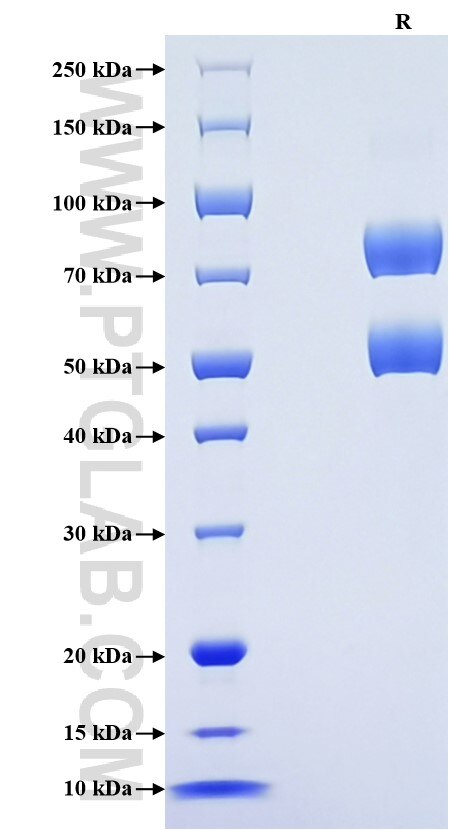Recombinant Human SUSD2 protein (rFc Tag)
Species
Human
Purity
>90 %, SDS-PAGE
Tag
rFc Tag
Activity
not tested
Cat no : Eg2627
Validation Data Gallery
Product Information
| Purity | >90 %, SDS-PAGE |
| Endotoxin | <0.1 EU/μg protein, LAL method |
| Activity |
Not tested |
| Expression | HEK293-derived Human SUSD2 protein Gln28-Arg782 (Accession# Q9UGT4) with a rabbit IgG Fc tag at the C-terminus. |
| GeneID | 56241 |
| Accession | Q9UGT4 |
| PredictedSize | 109.4 kDa |
| SDS-PAGE | 50-55 kDa and 70-85 kDa, reducing (R) condition |
| Formulation | Lyophilized from 0.22 μm filtered solution in PBS, pH 7.4. Normally 5% trehalose and 5% mannitol are added as protectants before lyophilization. |
| Reconstitution | Briefly centrifuge the tube before opening. Reconstitute at 0.1-0.5 mg/mL in sterile water. |
| Storage Conditions |
It is recommended that the protein be aliquoted for optimal storage. Avoid repeated freeze-thaw cycles.
|
| Shipping | The product is shipped at ambient temperature. Upon receipt, store it immediately at the recommended temperature. |
Background
Sushi domain containing 2 (SUSD2) is a type I transmembrane protein that encodes a type I transmembrane protein containing several functional domains inherent to adhesion molecules, which are frequently found in molecules associated with cell-cell and cell-matrix adhesion. Expression of SUSD2 in cancer cells correlates either positively or negatively with tumor growth, depending on the cancer type. Expression of Susd2 by mammary tumors promotes many aspects of breast tumorigenesis, including tumor immune evasion, angiogenesis and metastasis.
References:
1. Sheets, Jordan N et al. Oncotarget vol. 11,24 (2020): 2290-2301. 2. Zhao, Bao et al. Nature immunology vol. 23,11 (2022): 1588-1599. 3. Watson, Allison P et al. Molecular cancer research : MCR vol. 11,1 (2013): 74-85.

